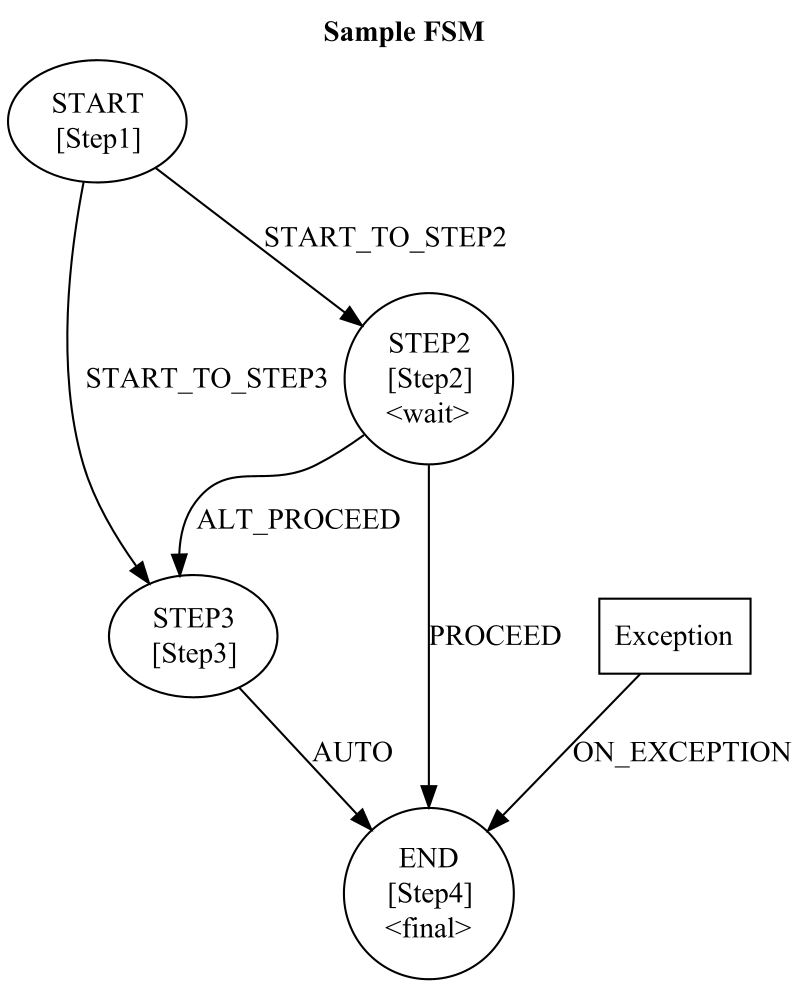SimpleFSM is a lightweight and customizable non-deterministic finite state machine library for Java, designed to simplify complex workflows and manage states effectively. The primary goal of this library is to provide developers with a simple yet powerful tool to implement and manage state machines within their applications.
Finite state machines (FSMs) are a powerful technique to manage the flow of control in an application. They allow you to define a set of states and transitions between those states, ensuring that the application behaves in a predictable and maintainable manner. SimpleFSM aims to provide an easy-to-use implementation of FSMs, which makes it ideal for managing complex workflows and handling state transitions in a more organized way.
- Simple and intuitive API for defining states, transitions, and events.
- Support for synchronous and asynchronous transitions.
- Built-in support for conditional transitions and auto-transitions.
- Configurable exception handling and error states.
- Trace mode for monitoring state transitions and debugging.
- Export and import of the state machine's state for persistence or communication between systems.
- Graphviz integration for visualizing the state machine.
To use SimpleFSM in your Java project, simply include it as a dependency and start defining states and transitions. Here's a basic example to get you started:
Include dependency. For example in maven pom.
<dependency>
<groupId>com.hexadevlabs</groupId>
<artifactId>simple-finite-state-machine</artifactId>
<version>1.0.0</version>
</dependency>
Sample Java code:
import com.hexadevlabs.simplefsm.ProcessingData;
import com.hexadevlabs.simplefsm.ProcessingStep;
import com.hexadevlabs.simplefsm.SimpleFSM;
import simplefsm.*;
class ProcessingStep1() extends ProcessingStep {
@Override
protected void process(ProcessingData data) {
// .. perform relevant processing
nextState("state2"); // set conditionally the next step.
}
}
public class MyFSM {
public static void main(String[] args) {
// Create a new SimpleFSM instance
SimpleFSM fsm = new SimpleFSM.Builder()
.state("state1", new ProcessingStep1())
.conditional().goTo("state2")
.conditional().goTo("state3")
.and()
.state("state2", new ProcessingStep2(), true) // Pause after step
.on("event2").goTo("state3")
.end()
.finalState("state3", new ProcessingStep3())
.build();
// Initialize the FSM with a starting state and data
ProcessingData data = new ProcessingData();
fsm.start("state1", data);
// Trigger events to drive the FSM
fsm.triggerEvent("event2", data);
// Check if the FSM has reached a final state
if (fsm.isFinished()) {
System.out.println("FSM has reached a final state: " + fsm.getFinalState().getName());
}
}
}In this example, we define a simple FSM with three states and one events. Each state has a processing step associated with it, which can be any class that extends ProcessingStep. The processing steps are responsible for performing the required actions in each state and setting the next state, if necessary. For a more in depth demo take a look at SimpleFSMDemo.
The SimpleFSM.Builder class provides a fluent API for defining states, transitions, and other FSM properties, making it easy to build complex state machines in a clean, readable way.
Using the SimpleFSM.toGraphviz() method you can generate a Dot notation graph representing the FSM. This text can be rendered in various ways such to a PNG file. An example of what it will look like is below:
- Consider adding timeout handling for events.(seems complex)
- Should the state of FSM be represented as graph structure instead of Hashtable. probably needed for high perforce.
- For a completed FSM draw a graph that shows the path taken by that execution. Seems like nice idea for debugging.
- For additional features need to see what real world use-cases demand.
We welcome contributions to SimpleFSM! If you'd like to contribute, please fork the repository, make your changes, and submit a pull request.
- 1.0.1 Make ProcessingData Serializable
- 1.0.2 Add setProcessingStep() to State class.
- 1.1.0 Add Parallel processing of states. Split handler.
- Exception handling in split processing.
- Enforce the structure of the Split processing. Don't allow invalid transitions.
- More formal guarantees what state the state machine may be in at any one time.
SimpleFSM is released under the Apache Version 2.0
